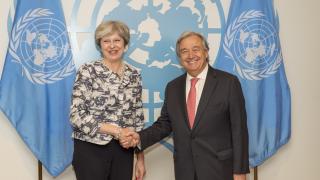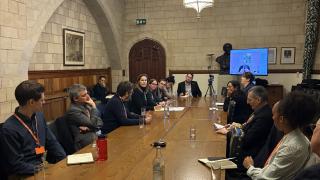
The UK needs to demonstrate its added value to the United Nations and adopt a principled and values-driven foreign policy if it is to maintain its current influence after it leaves the EU, according to a report released today by UNA-UK.
The report – Global Britain in the United Nations – is the outcome of a research project by academics from the Universities of Manchester, Leeds and Southampton on behalf of the United Nations Association, funded by the British Academy.
The researchers interviewed 29 participants, including UN diplomats, UK officials and individuals from non-governmental organisations. They found that the UK faces “considerable challenges in maintaining its current level of influence once it has exited the EU.”
The UK’s current record in the UN is mixed: it “takes a strong role in drafting resolutions and agenda-setting and is generally seen as a skilled negotiator” in the UN Security Council, but “we have very little influence on the General Assembly”.
Crucially:
“Brexit will have an impact on the UK’s standing at the United Nations. British diplomats will perform strongly but they will lose political capital because they are less able to align their campaigns in the Security Council and the General Assembly with the influence of their colleagues in Brussels.”
Interviewees said that if it were not for the UK’s continued commitment to spending 0.7% of Gross National Income on Official Development Assistance, the UK’s reputation “would be in sort of free fall territory”. Nevertheless “the decline in UK influence [in New York] is palpable. It’s partly Brexit, but not only.”
The report suggests that the impact of Brexit can be offset and the UK’s influence maintained if the UK invests in multilateralism and provides clear principled, values-driven leadership.
Recommendations include:
- Specific policy ideas and resources from London, demonstrating the value of the United Kingdom in international forums. One such opportunity is presented by Secretary General António Guterres’ call for a “quantum leap in collective action” on peace operations, including leadership in New York on the implementation of protection of civilian mandates. This could also provide one means of following through on Foreign Secretary Jeremy Hunt’s commitment to “do more within our budget on atrocity prevention”;
- Addressing gaps in diplomatic capacity at the General Assembly, which will develop as the UK is no longer able to rely on EU for burden sharing and support;
- Maintaining resolutely the UK’s 0.7% commitment to foreign aid – a major source of soft power and influence.
Angie Pankhania, Deputy Director of UNA-UK, said:
“This report provides an evidence base for what we have long argued. It is absolutely possible for the UK to “be an influential player” in international forums such as the United Nations. But it requires a principled and consistent approach. The UK cannot cherry-pick its favourite bits of multilateralism, it must invest in the health of the system as a whole”.
Lead author Dr Jess Gifkins, from the University of Manchester, said:
“Our project shows that the impacts of Brexit go beyond the UK and the EU to the UN where the UK’s reputation is tarnished and its capacity for influence is weakened.”
Professor Jason Ralph, from the University of Leeds, who led the research project, added:
“Our report shows there is widespread confusion about what ‘Global Britain’ means, and doubts about the UK’s capacity to deliver the resources to back up its diplomatic leadership.”
Researcher Dr Samuel Jarvis, from the University of Southampton, added:
“The direct policy implications of a new Global Britain strategy remain unclear, particularly in terms of how it might differ from the UK’s current strategy as a member of the EU.”
Professor Ash Amin, Foreign Secretary of the British Academy, said:
“The range of engagement the researchers have been able to enjoy with current and former diplomats in particular gives a well-rounded, expert view of the UK’s current and future capabilities and strategies at the UN and how the idea of Global Britain post-Brexit is being received – it shows there is much work to be done whilst highlighting the esteem in which the UK’s Mission to the UN is held by a range of interlocutors.”
You can read the report here.






